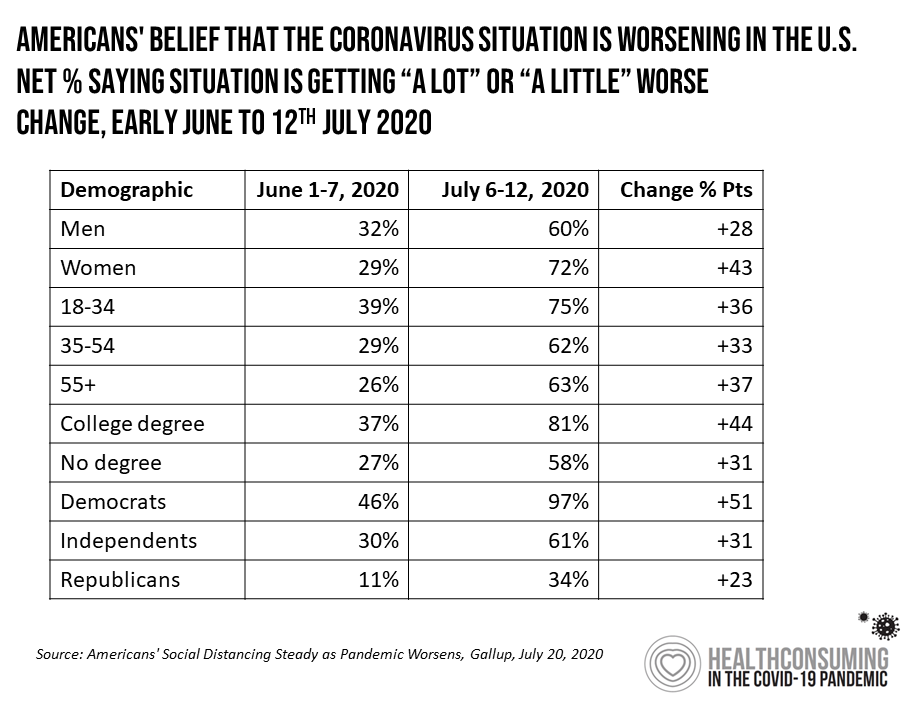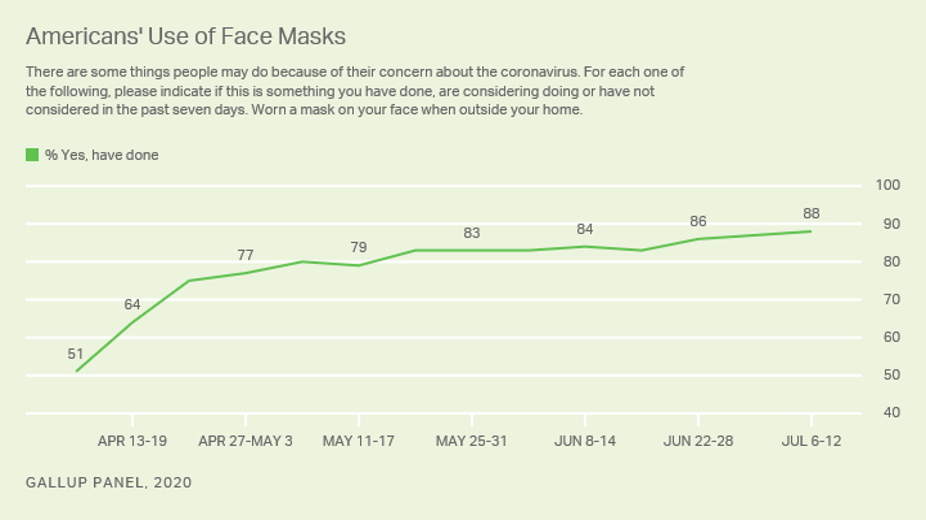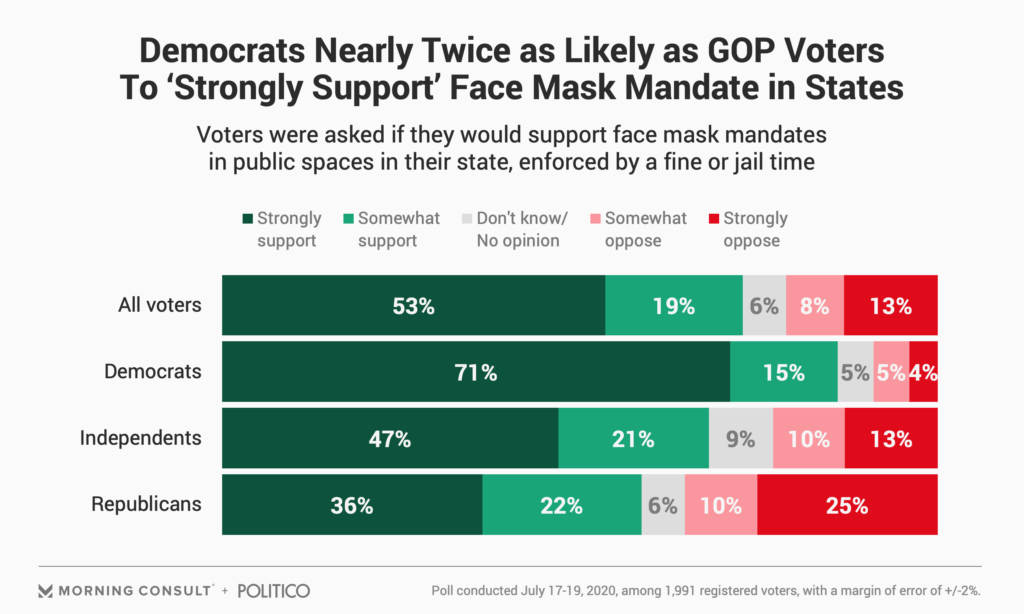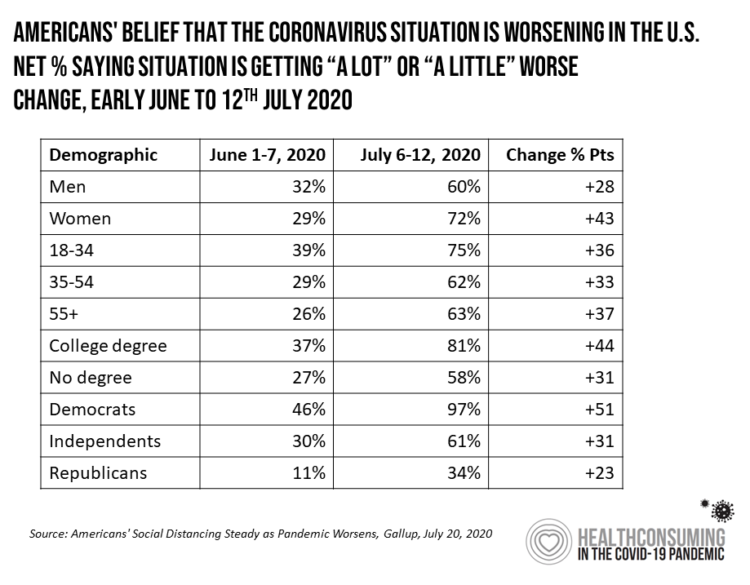With growing coronavirus case hotspots in southern and western states, more Americans perceive the pandemic is worsening this summer, shown by a Gallup poll published 20 July 2020. Gallup titles the analysis, Americans’ social distancing steady as pandemic worsens.
 The first table organizes Gallup’s data by demographics, illustrating a significant gap between how women perceive the exacerbating pandemic compared with men. In early June, roughly one-third of both men and women saw COVID-19 was getting “worse”; five weeks later, in the second week of July, men and women’s perceptions were 12 points apart with more women concerned about the situation worsening than men.
The first table organizes Gallup’s data by demographics, illustrating a significant gap between how women perceive the exacerbating pandemic compared with men. In early June, roughly one-third of both men and women saw COVID-19 was getting “worse”; five weeks later, in the second week of July, men and women’s perceptions were 12 points apart with more women concerned about the situation worsening than men.
This was a 43-point change in the percent of women over five weeks compared with a 28 percent change for men.
By age, each of the three cohorts (18-34, 35-54, and 55 and over) changed in similar point ranges (from 33 percentage points to 37 points).
But the degrees’ difference based on a person’s level of education — whether having a college degree or no degree — revealed a big chasm, with many more U.S. adults having a college diploma concerned about the worsening of the pandemic compared with those who had no degree.
By party identification, virtually all Democrats perceived the coronavirus pandemic was worsening (97%) versus 34% of Republicans. The percentage of Independents who felt COVID-19 was worsening doubled from 30% to 61%.
 Gallup’s poll also asked about Americans’ use of face masks. The second chart exhibits the increasing line of people having worn a mask when outside of their home in the past seven days, with nearly 9 in 10 U.S. adults doing so in the second week of July.
Gallup’s poll also asked about Americans’ use of face masks. The second chart exhibits the increasing line of people having worn a mask when outside of their home in the past seven days, with nearly 9 in 10 U.S. adults doing so in the second week of July.
While 9 in 10 people wearing a mask at least once in the past week is a positive tick up from where we were in April 2020, only one-half of Americans say they “always” wear a mask outside; another one-fourth does “very often,” the survey found.
Some 13% of people said they “never” wear a face covering in the study.
By party ID, 96% of Democrats said they wore a mask always or very often, compared with 51% of Republicans saying so.
By gender, 82% of women told Gallup they wore a mask always or very often, versus 65% of men.
 Health Populi’s Hot Points: Today’s Morning Consult/Politico poll, conducted July 17-19, was published showing further political party differences regarding face mask mandates in the U.S.
Health Populi’s Hot Points: Today’s Morning Consult/Politico poll, conducted July 17-19, was published showing further political party differences regarding face mask mandates in the U.S.
The third bar chart shows that 53% of Americans felt “strong support” for face mask mandates in public spaces in a voter’s state of residence, which would be enforced by a fine or jail time. Another 19% of people somewhat supported such a law.
This varied by political party:
- 86% of Democrats supported a face mask mandate with a punishment
- 68% of Independents favored the mandate
- 58% (a majority) of Republicans felt so.
Throughout the U.S., state governors and local mayors have been requiring the donning of face coverings in public. One of those governors, Gretchen Whitmer of Michigan, wrote an op-ed in today’s New York Times titled, Mask Up, America.
A growing number of retail stores are doing the same, which I discussed here in my post on how private sector companies are taking on public health roles.
In his first Coronavirus Task Force meetings held yesterday after many weeks of silence, President Trump uttered support for face masks if not consistently worn “all the time,” at least sometimes. The issue mask-wearing has turned political, with science backing the concept. Wearing masks has been found to bolster the U.S. gross domestic product, a Goldman Sachs analyst calculated (here, explained in Health Populi).
Last week, Robert Kaplan, President of the Dallas Federal Reserve Bank, asserted that, “if you want to reopen the economy faster, you want to get people back on planes and in stores,” mask-wearing would be key to reversing the pandemic. Federal Reserve management tend not to get political in their independent postures, so this was a noteworthy call-out.





 Thanks to Feedspot for naming this blog, Health Populi, as a
Thanks to Feedspot for naming this blog, Health Populi, as a